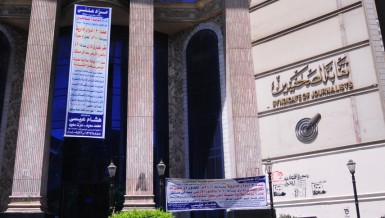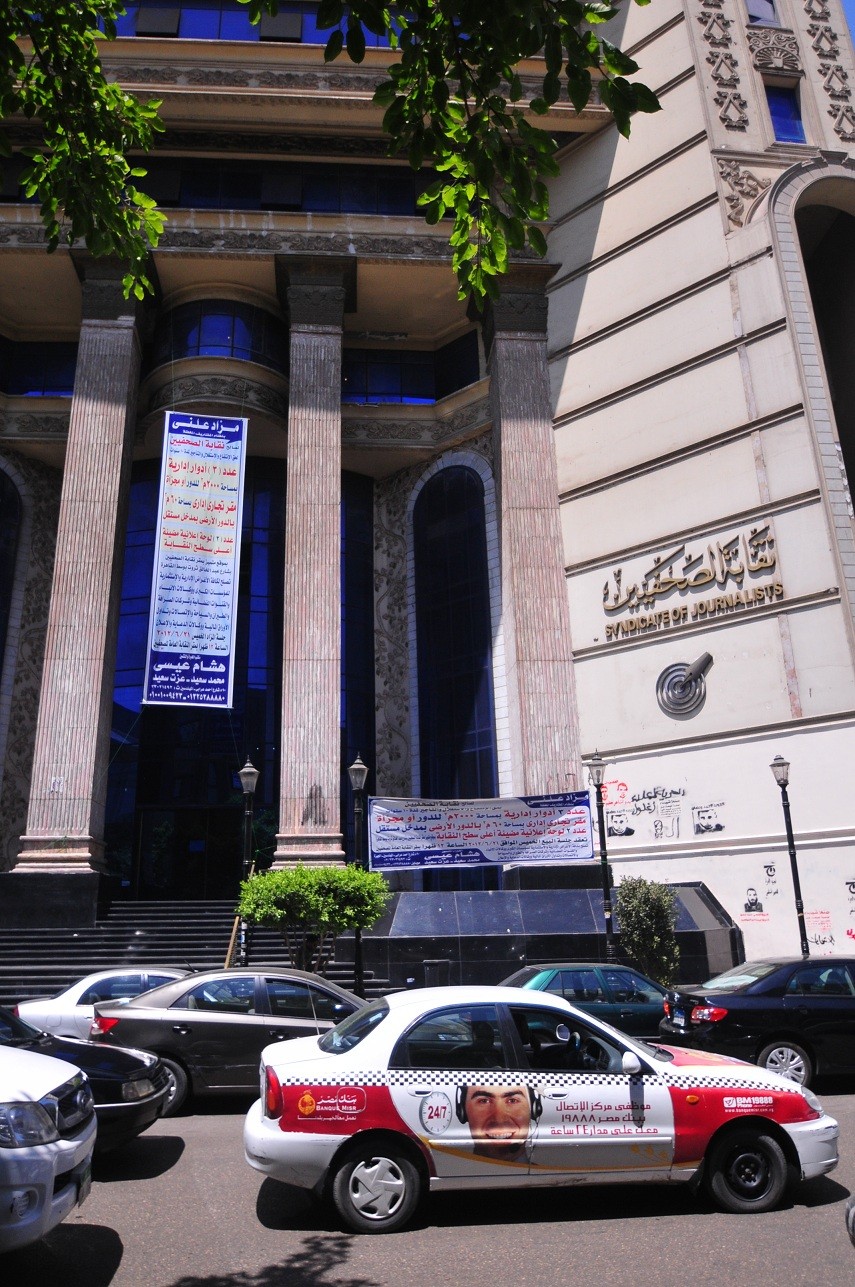
(DNE File Photo)
Members of the Popular Front for the Suez Canal Axis (PFSCA) gathered outside the Press Syndicate on Saturday to protest the law submitted to the Shura Council by the government for developing the Suez Canal region.
Front members protested alongside Suez families, said Reem Adel, PFSCA media coordinator. PFSCA was established to monitor the development of the Suez Canal region. Abdel Hamid Kamal, a founding member of PFSCA, said the front rejects the proposed law because there is no general plan for the development project.
“The cabinet cannot refer such a development law to the Shura Council without first holding popular discussions with the families of the Canal Cities of Ismailia, Suez and Port Said,” Kamal said.
He stated that the proposed law would create a sovereign state within Egypt and would allow foreigners the rights to Egyptian land and property.
Port Said Youth Coalition and the Port Said 2020 movement organised a popular conference to discuss the proposed law in Port Said on Friday.
The conference hosted public figures such as lawyer Amir Salem, feminist activist Shahenda Maqlad, television presenter Hala Fahmy, and psychiatrist Manal Omar. It was also attended by Port Said residents.
“This is yet another plot to seize Egypt’s resources and keep its people poor,” said Maqlad. She criticised the proposed law for breaking down Egypt into independent regions and jeopardising its independence. “We want the Suez Canal region to remain under the state administration’s authority,” she said.
The law provoked nationwide controversy, with Councilor Tarek Al-Beshry criticising the law in an editorial for independent daily Al-Shorouk on Friday.
“The proposed law’s 30 articles do not organise the region’s development,” Al-Beshry said in the editorial. “They just remove the state’s authority over the Suez Canal region.”
The draft law was published by independent daily Al Masry Al Youm two weeks ago. Article 2 of the law states that a general authority for the Suez Canal region will be established and the governing system would be decided by the president.
Article 6 grants the general authority’s chairman ministerial power over the region, but states that the Ministers of Defence, Interior, Justice and the chairman of the Suez Canal Authority will retain their authority. Al-Beshry criticised the idea of granting the general authority ministerial powers without holding them accountable to the legislative authority.
“If the Shura Council approves this law, it would be ceding its authority to legislate to the president,” Al-Beshry said.
This, Al-Beshry wrote, violates Articles 1 and 5 of the constitution. Article 1 states that Egypt is “a unified, un-divided country”, and Article 5 states that the Egyptian people are the “source of authority”.
Minister of Defence Abdul Fatah Al-Sisi told state-owned Al-Ahram on Saturday that the Armed Forces’ demands regarding the proposed law had immediately been met.
Article 13 of the proposed law states that the ownership of all state-owned lands inside the Suez Canal region would be devolved to the region’s authority except lands of the Armed Forces, the Ministry of Interior and the Suez Canal Authority. Article 15 prevents the authority from disposing of the lands unless through usufruct, excluding residential areas.
Article 10 categorises the authority funds as ‘private’. Article 14 gives the authority the right to strip individuals of their private properties within the Suez Canal region for the general interest of the state. Al-Beshry criticised this authority, questioning whether it could be used to grant the region’s authority private funds.
“This law exempts investors in the region of taxes and customs,” said Kamal. “It nullifies the jurisdiction of the labour law as well as the customs law within the Suez Canal region.”
Article 27 of the proposed law gives investing companies a number of perks. Companies would receive exemptions of trade and industrial activity taxes for ten years, stamp taxes and documentation fees for three years, and customs taxes on all imports necessary for the company’s establishment such as machinery and instruments.
Article 7 states that the authority’s administration would consist of 15 members, appointed by the president. They include the chairman, who would also take the title of deputy prime minister, alongside 14 other members, one of which would be appointed as deputy chairman. The 14 members must include two members with financial experience, two members with legal experience, two investors, three members with engineering and administrative experience and five members representing the governorates making up the region.
Article 1 of the law states that the borders of the Suez Canal region are to be outlined by a presidential decree. It added that the region includes East Port Said, northwest of the Suez Gulf, the Ain Sokhna Port region, and the Technology Valley in Ismailia, among other areas in the region.
Former Prime Minister Essam Sharaf, who was among the advisory team for the Suez Canal development project, resigned with his team on 24 April. Taher Hozayn, a former member of the advisory team, told Al-Ahram the resignation came after the governmental aid they were promised by the government was inexplicably withdrawn and the cabinet drafted the proposed law without consulting them.




